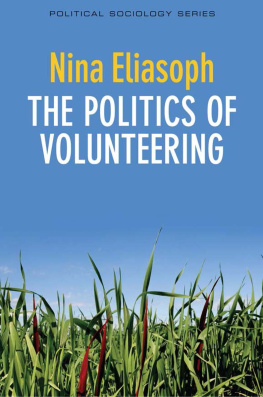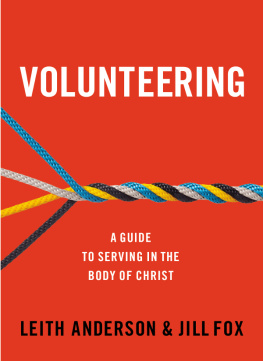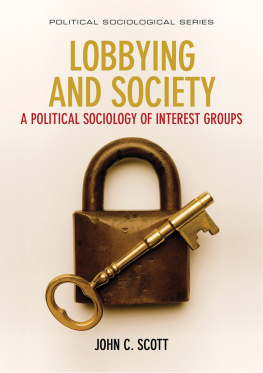The Politics of Volunteering
Copyright Nina Eliasoph 2013
The right of Nina Eliasoph to be identified as Author of this Work has been asserted in accordance with the UK Copyright, Designs and Patents Act 1988.
First published in 2013 by Polity Press
Polity Press
65 Bridge Street
Cambridge CB2 1UR, UK
Polity Press
350 Main Street
Malden, MA 02148, USA
All rights reserved. Except for the quotation of short passages for the purpose of criticism and review, no part of this publication may be reproduced, stored in a retrieval system, or transmitted, in any form or by any means, electronic, mechanical, photocopying, recording or otherwise, without the prior permission of the publisher.
ISBN-13: 978-0-7456-6956-4
A catalogue record for this book is available from the British Library.
The publisher has used its best endeavors to ensure that the URLs for external websites referred to in this book are correct and active at the time of going to press. However, the publisher has no responsibility for the websites and can make no guarantee that a site will remain live or that the content is or will remain appropriate.
Every effort has been made to trace all copyright holders, but if any have been inadvertently overlooked the publisher will be pleased to include any necessary credits in any subsequent reprint or edition.
For further information on Polity, visit our website: http://www.politybooks.com
Contents
Introduction:
What Are Civic Associations?
You have probably done some volunteer work. Maybe you did it because you cared about someone. Maybe it was a requirement for high-school graduation. Maybe you needed a line on your CV, to demonstrate to future employers that you were a good person, or maybe you needed some good, unpaid work experience. Maybe you were amazed at how much you helped someone, or how much you learned. Maybe you secretly wondered if you were doing any good for anyone at all.
Less likely is the possibility that you engaged in political activism, trying to change society in a more dramatic way than a volunteer usually does. Usually, volunteering offers the possibility for people to give hands-on, immediate help for the needy food, blankets, help learning to read. Activists usually aim to change broader social conditions, so that people are not so needy in the first place, but already have enough food, enough blankets, and enough help learning to read. Sometimes, activists criticize volunteers for putting band-aids on problems that require surgery.
Probably, you have never heard anyone say anything critical about volunteers, but lately, a few people have started to murmur some doubts about the proliferation of volunteer projects around the world. When, for example, a corporate polluter stages a splashy volunteer event, critics say it is designed to whitewash the oil spills away. When you are forced to volunteer, critics call it an oxymoron. When well-meaning volunteers devote themselves to feeding the homeless, while voting for policies that cut aid for housing, critics point out the discrepancy.
In these and other ways, volunteering is starting to become controversial. Are any of the critics doubts valid? What trends are shaping volunteer work today? Why would activists ever scorn volunteers? Is there a way to strike a balance between the goods that come from volunteering and the goods that come from political activism? To answer these questions, we first have to understand why most of us put so much stock in volunteering and in the importance of non-governmental organizations. The volunteer is a figure that is, in our imaginations, so pure, it is almost impossible to imagine a harmful one. Yet, sometimes, volunteers can do great harm. This book opens up the question of how volunteers and NGOs can do harm, as well as tremendous good. What makes civic life effective? What can kill effective civic life? What brings it to life?
Chapter 1 examines the theories and beliefs that lead so many people to treat the volunteer as a near-sacred figure. A thread running through our answers to this question is a comparison between two common forms of civic association: volunteering and political activism. While volunteers often try to separate their work from politics, and just to concentrate on helping individuals one at a time, chapter 1 will also show how volunteering can sometimes lead people to pose bigger questions about how our society works. Sometimes, that is, volunteers start off serving meals to the hungry and then go further, to ask why a wealthy society like ours even has hungry people to begin with. In other words, the volunteer starts to realize that helping individuals requires not just one-on-one volunteer work, but political activism, as well.
Using examples from the disability rights movement, the anti-domestic violence movement, Occupy Wall Street, and other civic associations, chapter 2 will compare volunteering and activism, showing how they are different and asking how they can complement each other. When cut off from one another, both may wither.
In any society, civic associations work in a balance with markets and state. Chapter 3 examines this balance. Common sense in the USA and the UK often says that if the state is strong, civic life is weak, but this chapter will draw on numerous studies to show that our common sense is wrong. It has not been the case in American history, and is not true about the rest of the world, either. Common sense, in places like the USA and UK, holds that a combination of volunteers and the market is the ideal solution to nearly all social problems, whereas in places like Norway or France, common sense holds that the state can do more to provide people with basic rights to prevent poverty, hunger, and homelessness, to educate children, and to provide resources for aiding the sick and the elderly. Both sorts of countries have active civic associations, but the tripod of market, state, and civic association balances differently in the different nations.
Chapter 4 examines a prevalent form of civic association: the Non-Governmental Organization (NGO; also called nonprofit in the USA). Both volunteering and activism now tend to take place in NGOs. Many NGOs share a set of often mismatched missions: to be open and inclusive; to respect grassroots, local unique people, places, and customs; to encourage innovation, experimentation, and personal transformation among participants; to help the needy; and to provide full, clear, transparent documentation to multiple, distant, hurried donors. Drawing on NGOs experience in Albania, Malawi, Nigeria, the USA, and elsewhere, this chapter will show that these noble missions often clash. Again, we see that the seemingly harmless aid to the needy can sometimes cause great harm.
Vast inequality is another possible culprit in the quest to find out what hampers healthy civic associations. The wealthy and powerful have almost always participated more in civic affairs than the poor and downtrodden. Lately, wealthy, powerful funders have been creating fake civic associations: Astroturf instead of grassroots associations. In chapter 5, we have to ask what happens when social inequality becomes so vast that ordinary volunteers or activists become tiny specks compared to these powerful giants. This chapter describes the obstacles that non-elites face when trying to participate.
After all these discouraging chapters, it might be easy to conclude that volunteers and activists are helpless to make the world better. But this would be an incorrect conclusion. Civic associations can and often do change the world for the better. Chapter 6 asks how civic associations try to overcome the difficulties that the previous chapters have described.







